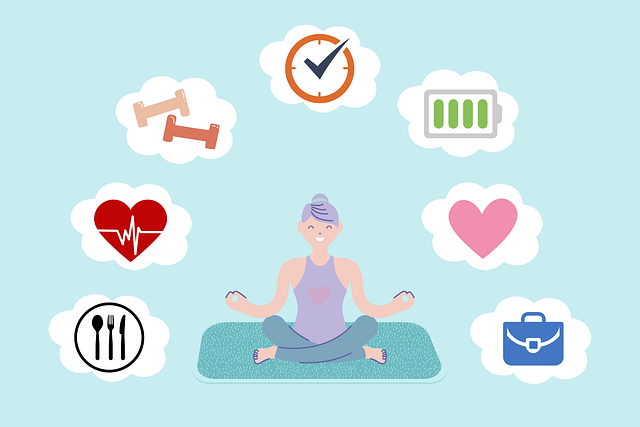Mindfulness, as practiced through Littleton Play Therapy, is a powerful tool for enhancing children's mental well-being, teaching them emotion regulation, improved focus, and resilience. By creating a dedicated meditation space and incorporating techniques like breath awareness exercises and body scans, individuals can process trauma, reduce mental illness stigma, and develop healthy coping mechanisms. This fosters self-awareness, emotional intelligence, and overall mental health improvement. Regular mindfulness practice, starting with 10-15 minutes daily, benefits stress management, communication, and personal relationships, making it a valuable asset in both therapy sessions and daily life.
Mindfulness meditation is a powerful tool to enhance children’s emotional well-being, and Littleton Play Therapy offers guidance on this transformative practice. This article explores practical steps to introduce mindfulness to young minds, fostering focus and calmness. We delve into creating a nurturing space, engaging children with breath awareness, and using sensory techniques through body scans. By incorporating these strategies, parents and therapists can make meditation an enjoyable part of daily routines, promoting resilience and emotional intelligence in children.
- Understanding Mindfulness and Its Benefits for Children
- Setting Up a Safe and Inviting Space for Meditation
- Engaging Children in Breath Awareness Exercises
- Incorporating Body Scans and Sensory Techniques
- Making Meditation a Consistent Part of Daily Routine
Understanding Mindfulness and Its Benefits for Children

Mindfulness has gained significant attention as a powerful tool for enhancing mental well-being, and its benefits extend to children as well. This ancient practice encourages individuals to focus on the present moment, observing their thoughts and sensations without judgment. For kids, mindfulness can be a game-changer, offering them a way to regulate emotions, improve concentration, and build resilience. Through simple breathing exercises and mindful activities, children learn to acknowledge and accept their feelings, leading to better mood management and reduced anxiety.
In today’s fast-paced world, where children often face various challenges like academic pressures and social stressors, mindfulness can serve as a sanctuary. Littleton Play Therapy Therapy, for instance, integrates mindfulness techniques to create a supportive environment for kids to process trauma, reduce the mental illness stigma, and develop healthy coping mechanisms. By fostering self-awareness and emotional intelligence, mindfulness practices empower children to navigate their feelings, leading to improved overall mental health and well-being.
Setting Up a Safe and Inviting Space for Meditation

Creating a dedicated space for meditation is an essential step in establishing a regular mindfulness practice. This sanctuary should be a place where you can retreat to, free from distractions and daily stresses. Consider transforming a quiet corner of your home into a tranquil zone by incorporating elements that foster relaxation. Soft lighting, comfortable seating, and calming decorations can all contribute to making this space inviting and peaceful. Think about adding natural touches like plants or a small water feature to enhance the sense of serenity.
Littleton Play Therapy offers valuable insights into cultivating mindfulness as a means of conflict resolution techniques and burnout prevention. By setting up this serene environment, you’re not just preparing a physical space; you’re investing in your mental and emotional well-being. Make it personal—fill your meditation corner with objects that resonate with you—and watch as your practice evolves into a powerful tool for cultivating positive thinking and overall tranquility.
Engaging Children in Breath Awareness Exercises

Engaging children in breath awareness exercises is a powerful tool within Littleton Play Therapy practices. These simple yet effective techniques help young individuals cultivate mindfulness, promoting emotional regulation and stress reduction methods. By encouraging kids to focus on their breath, therapists can facilitate a sense of calm and present-moment awareness, essential for self-care practices.
Incorporating breathwork into play therapy sessions offers a creative approach to burnout prevention strategies for healthcare providers working with children. It allows for a natural and engaging way to teach coping skills, helping kids navigate their emotions and enhance their overall well-being. This practice is particularly beneficial in today’s fast-paced world, where stress reduction methods are crucial for both children and the adults supporting them.
Incorporating Body Scans and Sensory Techniques

Incorporating body scans and sensory techniques is a powerful way to deepen mindfulness meditation practice, especially in the context of Littleton Play Therapy. Body scans involve slowly directing attention to different parts of the body, observing sensations, tensions, or any physical feelings without judgment. This practice helps individuals cultivate a deeper connection with their bodies and enhance self-awareness. By focusing on specific sensory experiences, such as breathing, touching, tasting, seeing, hearing, or smelling, practitioners can further engage their senses, making meditation more immersive and effective. These techniques are particularly beneficial for managing stress, anxiety, and promoting emotional well-being, which aligns with the goals of Cultural Sensitivity in Mental Healthcare Practice.
For instance, during a body scan meditation, one might encourage individuals to notice the sensation of feet touching the ground, the subtle movements of the breath in the nose, or the feeling of clothing against the skin. This mindful engagement with sensory input can foster coping skills development and provide an accessible way to explore and regulate emotions. By combining body scans with mindfulness, individuals can learn to cultivate present-moment awareness, enhancing their overall emotional well-being promotion techniques, even outside formal meditation sessions.
Making Meditation a Consistent Part of Daily Routine

Incorporating mindfulness meditation into your daily routine can profoundly enhance mental wellness and overall life satisfaction. Start by dedicating just 10-15 minutes each day to practice, choosing a time that aligns with your personal rhythm. Consistency is key; consider setting an alarm or using apps designed for mindful moments as reminders. Over time, you may find yourself looking forward to this quiet space, allowing your mind and body to reconnect in the midst of Littleton play therapy sessions or other Trauma Support Services.
Regular meditation practice not only promotes relaxation but also fosters effective communication strategies and Mental Wellness Journaling Exercise Guidance. By engaging in this routine, you cultivate a deeper understanding of your thoughts and emotions, enabling more thoughtful responses during interactions. This enhanced self-awareness can positively impact various aspects of your life, from personal relationships to professional endeavors, creating a sense of calm amidst the busyness of daily life.
Mindfulness meditation, as demonstrated through these practices tailored for children, offers a powerful tool for parents and caregivers seeking to enhance their little ones’ emotional well-being. By creating a safe space, engaging young minds with awareness exercises, and integrating these practices into daily routines, we can nurture resilience and promote healthy coping mechanisms in our children. Inspired by the principles of Littleton Play Therapy, these mindfulness techniques allow kids to explore their senses, calm their minds, and build a strong foundation for emotional intelligence.












